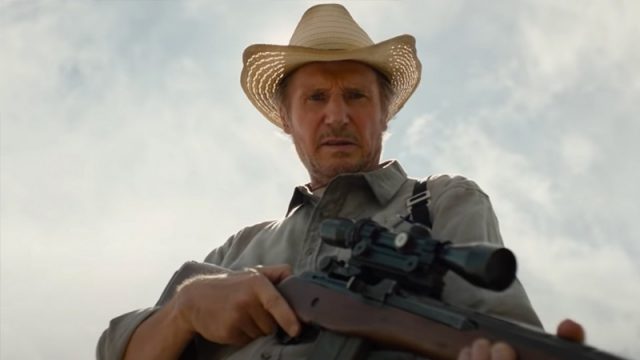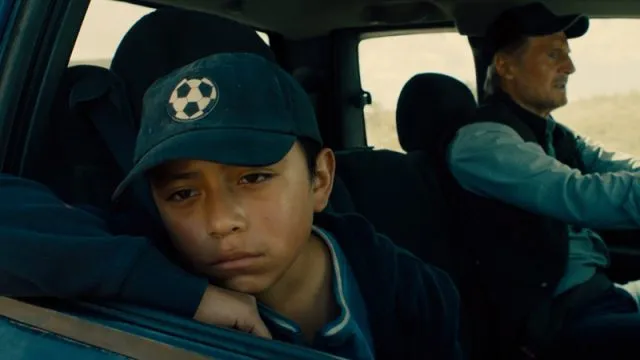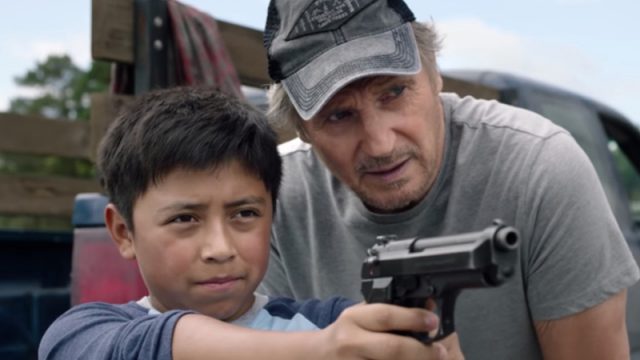Just in time for The Marksman’s digital release, ComingSoon.net got the opportunity to chat with director Robert Lorenz, who discussed the Liam Neeson action drama and took a moment to reflect back on the Academy Award-winning film Million Dollar Baby for which he served as producer and first assistant director.
The official logline for The Marksman reads as follows:
“Hardened Arizona rancher Jim Hanson (Liam Neeson) simply wants to be left alone as he fends off eviction notices and tries to make a living on an isolated stretch of borderland. But everything changes when Hanson, an ex-Marine sharpshooter, witnesses 11-year-old migrant Miguel (Jacob Perez) fleeing with his mother Rosa (Teresa Ruiz) from drug cartel assassins led by the ruthless Mauricio (Juan Pablo Raba). After being caught in a shoot-out, a dying Rosa begs Jim to take her son to safety to her family in Chicago. Defying his cop daughter Sarah (Katheryn Winnick), Jim sneaks Miguel out of the local U.S. Customs and Border Patrol station and together, they hit the road with the group of killers in pursuit. Jim and Miguel slowly begin to overcome their differences and begin to forge an unlikely friendship, while Mauricio and his fellow assassins blaze a cold-blooded trail, hot on their heels. When they finally meet on a Midwestern farm, a fight to the death ensues as Jim uses his military skills and code of honor to defend the boy he’s come to love.”
The Marksman was directed by Robert Lorenz from a script by Chris Charles, Danny Kravitz and Robert Lorenz and produced by Tai Duncan, Mark Williams, Warren Goz, Eric Gold and Robert Lorenz. The action thriller will be available on digital April 27, and Blu-ray & DVD May 11.
RELATED: CS Video: The Marksman Interview With Star Liam Neeson!
ComingSoon.net: What was it like working with Liam Neeson and Jacob Perez?
Robert Lorenz: Liam, I thought he was so right for this role because he has that really fearsome, tough edge to him that you believe, but he also can quickly switch into a likable character, and you buy that as well. So I was very concerned about pairing him with the right person and sort of narrowed down the casting to two young men. Jacob was one of them. And everybody in the production was really pushing me towards this one kid, who I liked, but Jacob just had this sort of swagger and this sort of underlying toughness that I felt served the role very well, even though he was so young and innocent. So I sent them both to Liam. And Liam felt the way I did — that Jacob was the guy — so, that’s where we went with him. And I think that their relationship really works.

CS: Absolutely. Jacob actually plays really well alongside Liam Neeson, especially considering this is his first acting gig.
Lorenz: Yeah, that was actually why I was getting such resistance because he had never acted in a film before. And everyone was very concerned that he wouldn’t be able to pull it off. But I said, ‘No, no, I can get the performance out of him.’ And that’s where Liam came in, because he said, ‘You know, don’t worry, I’ll help you get the right performance from him also.’ If you don’t have that cooperation from your lead, it can be a real problem. But he saw what I saw in Jacob, and he wanted to help me make it work. So that was a really ideal.
CS: Liam Neeson’s character, Jim, talks about how he served his country, paid his dues, and did what he had to do, but in the end felt like he lost everything. And he’s been frustrated by the lack of recognition and respect given to him by society. Was his character based on people you know, or have met over the years?
Lorenz: He wasn’t based, specifically — there’s a few people I used as reference — some ranchers out in Arizona, I read about them and their experience to bring some realism to that aspect. But in terms of his military background, I’ve made a number of military films, I produced American Sniper and Flags of Our Fathers and Letter From Iwo Jima, so, I know a lot of these guys, and I am very familiar with what they struggle with after they’ve served their country, and I have great admiration and appreciation for them. So, I wanted to find a way to pay tribute to that. And [Jim], he’s just a guy that doesn’t quite understand why he’s ended up where he has and he’s really initially focused on his personal problems in terms of his finances and his business and his personal relationships; and then, over the course of the story, comes to realize that it’s through helping others that you can find meaning and purpose and that’s really what saves him in the end.
CS: I love the bit where he goes looking for a map and the gas attendee has no idea what he’s talking about. How much of his current plight do you think is a matter of him giving up and letting the world pass him by?
Lorenz: That’s an interesting idea. I think you’re right. I think that that does play into it. I mean, I think that Liam, one of the things that drew him to the part was he liked the fact that he’d be playing his age; and I wanted to be authentic about what a guy like him would know — not using a cell phone and using his Atlas and just being sort of disconnected. I wanted it to feel real. And I think that all works as part of his character.
RELATED: Guy Pearce & Monica Bellucci Join Liam Neeson Action-Thriller Memory
CS: What I took away from this movie is that it’s all about choices — the ones that we all have to make, despite our circumstances, and despite everything that might happen to us along the way, we can all choose to do the right thing. Was that a sentiment you wanted audiences to walk away with?
Lorenz: Absolutely. I mean, that’s because I think that’s true to most everybody. On the surface, you react to the world around you, and sometimes people get the wrong impression. But ultimately, we all think of ourselves as decent, good people. [Jim] may make some decisions early on, selfishly, he’s going to use this money to pay for his own mortgage and save himself, but ultimately, he decides that that’s not as important as helping this kid. And he’s willing to give that up. And I think that most people would come to that conclusion in the end.
CS: In a lot of ways, this movie feels like a tribute to the old westerns of decades past. And there’s even a bit where Jim and Miguel are watching Hang ’em High. Is The Marksman a concerted effort on your part to try and reinvigorate audience interest in this particular genre?
Lorenz: I don’t know if I’m capable of doing that, but I happen to like the western genre, and that’s one of the things that appealed to me about this movie and was sort of exciting as a filmmaker to go out and make it and sort of capture these grand vistas and these heroes that are — you know, on the face there’s a hero and villain but everybody’s got two sides to them. There’s no easy hero and villain, I guess I should say. Hang ’em High is one of my favorites. There is so much conflict in it for the characters in that movie that really appeals to me.
CS: Would you say the central conflict of The Marksman is the battle to save Miguel’s soul?
Lorenz: For me, I thought it was more about trying to save Jim’s soul. I mean, yes, you’re right. There is definitely that aspect to it. [Jim] in the end is trying to prevent this kid from ending up in a life that would be really miserable as we see from what the villain expresses there at the end. But I think that ultimately the kid saves Jim. He gives his life meaning and purpose and that’s where the saving comes in, for me.

CS: From a director’s standpoint, there are some great action scenes in this film, including the big climactic gunfight on the farm at the end. What challenges do these sequences present?
Lorenz: I look forward to them. You know, they’re fun to watch, they’re fun to create. I have to give credit to Mark Vanselow, our stunt coordinator. I always enjoy working with stunt men and camera operators and trying to figure out the best angles to make things convincing.
The challenge is just to make them a little bit different and not repeat the same things you’ve seen over and over again, because you know, ultimately, these movies always end up with a confrontation between our hero and villain. And there’s only so many ways you can do that … and it gets repeated over and over again. So yeah, that was the challenge was to try to find something new to bring to it and make it just a little bit different. I don’t [want to] give the ending away to people, but I think involving the kid and then having the villain reveal something there at the end is was one way that I tried to make it different.
CS: Million Dollar Baby is a movie I’ve watched a million times. What do you think is the main reason that film continues to work so well with audiences.
Lorenz: I don’t know exactly. Just three really great performances. I was just thinking about that the other day, and I think Hillary [Swank] won an Oscar and Morgan [Freeman] won. And Clint [Eastwood] won for directing, but he didn’t win anything for acting. And I really thought that was too bad because I really think that was one of — if not his best performances ever. And I really think that he was the glue … his performance really brought that whole story to life. Yeah, I liked making that movie. All three of those actors were so good. And I think each of their performances were so strong. That’s, I think, what carried the movie through to the end.
My son is actually in the film. There’s some scenes in there where Hillary’s mom and sister are carrying a baby around. That’s my son she carries around throughout those scenes. And he’s never seen it! I keep telling him we have to sit down and watch it. He’s 17 years old now and he still hasn’t seen that movie.
CS: You’ve worked as a producer and assistant director on these amazing movies that we’re talking about — Million Dollar Baby Mystic River, American Sniper — yet, you’ve only directed one other film before The Marksman, which was Trouble With the Curve. Why was there such a long hiatus? And are you gearing up for more directorial projects in the near future?
Lorenz: When I started this adventure in Hollywood, that was the goal — to just to direct — and I thought assistant directing was a great way to expose myself to the craft and learn as much as I could. So, I started there. And then I had every intention of — I sort of felt like I had gotten to a point in my early 30s where I was like, ‘Okay, I’ve done enough of this and am just going to focus on directing now.’ And then Clint asked me to produce and I just thought, well, it would be kind of foolish to say no. So, I started that always with the goal of, ‘Okay, well, I’ll do this for a little bit, but I’m moving on to directing here very soon.’ Then we just had a run of movies from Mystic River and Million Dollar Baby — I couldn’t break away and we just kept going and going. And so [Clint] knew the whole time that I wanted to leave … Gran Torino came in and I said, ‘I want to direct this.’ And he’s like, ‘Oh, I really like it too. I want to direct it.’ But then Trouble With the Curve came and he said, ‘Okay, you can direct this one.’ And then I was all set to just leave, but I owed him at least another movie, and it was going to be A Star is Born. Interestingly, I had already signed on to produce that movie and [Clint] was going to direct it. And then it fell apart because we lost our lead actress, and then we turned to Jersey Boys, and then American Sniper; and then finally I just said, ‘Okay, that’s it. I’ve got to stop and focus entirely on my own stuff.’ So that’s where I am now.
CS: That seems like a good problem to have. Congratulations on The Marksman and good luck going forward!
Lorenz: Thank you very much, man. Nice talking to you too.
Check out the first trailer for The Marksman below:










